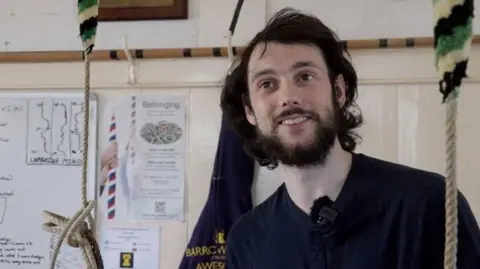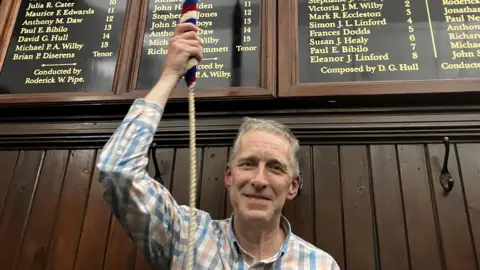Could church bells stop ringing at Christmas?
 BBC
BBCChurch bells are synonymous with Christmas, but could the sound of them ringing soon be consigned to history?
This is the concern outlined in a report by the Central Council of Church Bell Ringers, which outlines ongoing recruitment issues.
With fewer people attending church, and groups such as choirs and the Scouts supplying less people, the research suggests the number of ringers will decrease by 45% by 2047.
There are more than 5,000 ringable bell towers in the UK and more than 30,000 change ringers, with a call for action to get more people involved.
Bell ringing in the UK is done by pulling a rope that swings the bell 360 degrees which chimes the bell.
Iwan Cotgreave, 20, attends Swansea University and rings in the surrounding area, where there is a learners' group.
"That is going fantastically," he said. "We're trying to ring there as much as we can for any occasion that we can think of, particularly for Christmas."
Speaking to BBC Radio Wales Breakfast he said he has been helping the bells at St Mary's in Swansea ring again after people stopped during Covid, but its perception needs to change for more to join.
He added: "They have to try and break the perception of it being just old people that ring.
"It being in a church also puts people off if they aren't religious but anyone can come along and do it."
 Matthew Turner
Matthew TurnerMatthew Turner, 47, who rings in Cardiff, learnt to teach ringing because he was just "super keen" to get people engaged with it.
He said most of his ringers have come through the church but initiatives such as Ring for the King help bring in more people.
"These initiatives grab people's attention and gets them to join," he said.
"We had more than a dozen join our branch for the initiative."
Mr Turner added that ringing is a social activity and that he met a huge number of friends from it.
"The ringing community across the UK and across the world really is really quite close," he said.
"You've got that kind of instant welcome wherever you go.
"You can kind of walk through doors, and say 'hey, I can ring' and generally people will welcome you with open arms."
He also added that ringing on Christmas day felt quite special, saying: "People like to hear bells on Christmas morning. It's that sense of tradition."
 Simon Linford
Simon LinfordSimon Linford, the president of the Central Council of Church Bell Ringers, says that everyone who rings knows what the problems are.
"The council set up a committee some years ago, called the Ringing Trends Committee who spent lots and lots of time looking at lots and lots of data and came up with the obvious that we need to recruit more young people, and then no-one did anything.
"This time we can't do that again."
He attributed the decline to a drop in those attending church services.
"Part of the issue is that when I learnt to ring, when I was 13 or 14, I came through the church, and I was in the choir," he said.
"Bell-ringing recruitment didn't have to look any further than the church and associated groups like the Scouts generated enough people."
